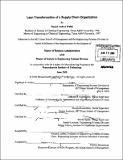Lean transformation of a supply chain organization
Author(s)
Walsh, Daniel Andres
DownloadFull printable version (24.79Mb)
Other Contributors
Leaders for Manufacturing Program.
Advisor
Deborah J. Nightingale and Donald Rosenfield.
Terms of use
Metadata
Show full item recordAbstract
There are two basic schools of thought regarding how to approach a Lean transformation. Either start with introducing Lean tools or start with driving a Lean cultural change. Academic researchers like Steve Spear (Harvard/MIT), Lean experts such as James Womack (Lean Enterprise Institute), and many Lean practitioners within the company believe that a "culture first" approach is more likely to create a sustainable Lean transformation rather than a "tools first" approach. So, who is responsible for this "culture?" The leaders of an organization are responsible for the culture. Leaders drive cultural change through incentive systems, performance management, and role modeling. One critical tenant of Lean is the concept of kaizen, or making change for the better. Kaizen and continuous improvement applies to everyone, everywhere, everyday. This paper proposes that if one's approach to Lean is "culture first," then the leaders who own driving cultural change should hansei (personal introspection and reflection) and kaizen his or her own leadership behaviors and practices to ensure a successful Lean cultural shift for the organization. Supply Planning Operations (SPO) decided to begin its own Lean journey in July 2007, and the transformation is still in its infancy. As part of the journey, the leadership team is reflecting on and comparing the group's leadership and management practices with those advocated by Lean experts. The team found that Toyota's leaders built an enabling bureaucracy to foster a high-performing learning organization. "Leading Lean" requires new approaches and behaviors that challenge existing group norms. This paper summarizes the gaps between SPO's current leadership norms and those identified by Lean experts. For example, SPO needs to continue developing their "people value stream" based on Lean organizational capabilities and healthy relational contracts between employees and management. These recommendations are not a prescription for success nor are they necessarily directly applicable to other groups. The intent of this thesis is yokoten (Toyota term for the horizontal transfer of information and knowledge) to share SPO's current understanding of its leadership problems with others on the Lean journey.
Description
Thesis (M.B.A.)--Massachusetts Institute of Technology, Sloan School of Management; and, (S.M.)--Massachusetts Institute of Technology, Engineering Systems Division; in conjunction with the Leaders for Manufacturing Program at MIT, 2008. Includes bibliographical references (p. 110-113).
Date issued
2008Department
Leaders for Manufacturing Program at MIT; Massachusetts Institute of Technology. Engineering Systems Division; Sloan School of ManagementPublisher
Massachusetts Institute of Technology
Keywords
Sloan School of Management., Engineering Systems Division., Leaders for Manufacturing Program.